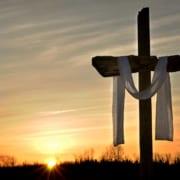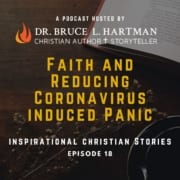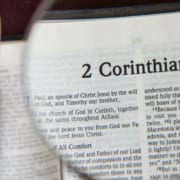What Is the Value of a Homemade Cross?
Fixing our eyes on Jesus, the pioneer and perfecter of faith. For the joy set before him he endured the cross, scorning its shame, and sat down at the right hand of the throne of God.
Hebrews 12:2
As I was putting on a sweater to go out recently, I accidentally broke the string to my cross and it fell off. Naturally driven to overthink, I wondered what it meant? Was it a message or something else? I never take off my cross and keep it on regardless of what I do. The string has broken before, I repaired it a few times. But this time there would be no repairing, the string had been repaired too many times.
The origin of my cross is that it was homemade and created for me by a good friend, Key, who lives in North Carolina. Connie and I had helped her with a few things. So she made the cross out of bronze and green wire. And then used string in place of a chain.
I was delighted when she gave it to me and promptly put it around my neck. Putting my old cross on the corner of my desk. Key is a sweet woman, with a rough exterior at times. What she has in life, she has fought hard to achieve. Not always understood by her neighbors, but once you get to know her and she trusts you, she becomes very open and kind.
She knew the cross would be very important to me, and with her limited resources this was what she could do for me in repayment.
So there I was, frustrated that this treasured item, that was symbolic of my faith and a dear friendship, was beyond repair. Connie, my wife, always knew what to do. Go to Hobby Lobby and find a similar piece of string, but perhaps a little sturdier.
Along the way we passed jewelry stores, making me wonder, if this cross, a symbol of faith and friendship, shouldn’t have something a little more ornate than just a piece of string. I saw chains for $150, but Connie kept on marching to Hobby Lobby.
We went into Hobby Lobby and looked around, not really quite finding what we were looking for. Then we met Wendy. Wendy is one of those salespeople you meet in a craft store. Handy and not afraid of tedious details, like a string for a cross.
Wendy studied the cross and gave us a roll of nylon string that matched the bronze background of the cross. Telling us if we spent the $2 it cost, she would put it on for us free of charge.
So, we did, but then she did something very unusual. She took the nylon string and made a sailor’s knot so that it could expand when put on or taken it off. A clever trick that only a craft salesperson or a Navy vet could do! Another piece of lore that is attached to my cross.
So why is all this important? Sure I could have bought a sterling silver chain. But this cross isn’t fancy. It’s very plain and homey. It needed something simple. Its real value is in what it represents.
Like our Lord, who was born in a barn. During his lifetime, never had more than sandals and a rough tunic. His crown was made of thorns. And his cross was two pieces of wood and some nails. Simple and not distracting from the real value of his life.
His life’s meaning meant so much more than material things. Even though he was God, he lived simply. His richness was in his service to humankind. He didn’t need shiny things to prove his worth.
For some an elegant and shiny cross could mean something different. Perhaps a way to show the Lord the respect that they have for the sacrifice that is represented by the cross. And they would be right.
For others, perhaps it is a reflection of their Christian values. A powerful acclamation to the world that they are a Christian. And they would be right.
For some like myself, it is both a recognition of the spiritual value of the cross and that is connected to a friendship or an important event.
But what is most important is the recognition of the statement the cross makes. A statement of outward commitment and faith in Jesus.
Let me explain. When I was serving a church, whose congregation was made up of mostly homeless people, we provided breakfast for free on Sunday morning.
Naturally, the church had limited resources and funding the breakfast was out of the question. So we visited the main street restaurants to look for donations. When I visited them, I looked for a cross. Perhaps hanging on the wall or near the cash register. Each time I saw the cross, I knew they would help. And they did.
With the help of these donations and volunteers, we were able to feed fifty or so people every Sunday. All connected by the cross.
The value of the cross isn’t what you paid for this great Christian replica. It is in what it stands for and a reflection of what we believe. It is so much more than just a piece of jewelry, regardless of its price.
Most importantly, It is a reminder of what Jesus did on his own cross for humankind.
An individual’s own cross is always very personal. Each cross having its own story of how it was acquired. Each cross has a special life connection with the person wearing the cross. A connection to Jesus and a person or set of events that led to its acquisition, creating special memories and stories.
And like our own faith and connection with Jesus, different person by person.
Click here to listen to the podcast
Blessings, until next time,
Bruce L. Hartman
Photo by Joel Holland on Unsplash
We love to give credit to budding photographers








